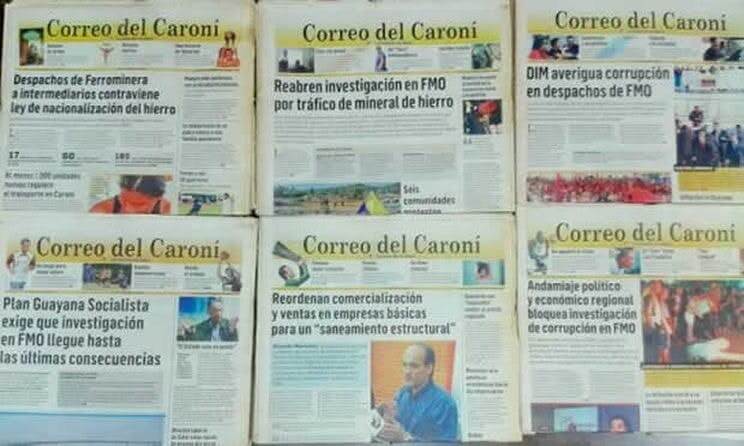Natera Febres was sentenced to four years in prison and fined $20,000 for reporting on a corruption case linked to the state-owned company CVG Ferrominera Orinoco and to Venezuela’s Directorate General of Military Counterintelligence. Natera Febres was indicted criminally on “libel” and “insult” charges by a businessman involved in the corruption case who served two years in jail and was released in 2015.
“The conviction against Natera Febres is a further confirmation of the climate of censorship and constant intimidation under which the media is forced to operate in Venezuela,” said HRF president Thor Halvorssen. “There’s no question that corruption has become a systemic problem under Maduro’s authoritarian regime. Government cronyism and lack of judicial independence have made the transparent operation and effective supervision of state enterprises an impossible task,” said Halvorssen.
In 2013, Correo del Caroní published a series of reports on an extortion case that involved a colonel in military intelligence, members of CVG Ferrominera Orinoco management, and private businessmen. The newspaper reported that the counterintelligence colonel was extorting both parties and threatening to reveal their involvement in acts of corruption. In July 2013, the newspaper also published an exclusive interview on the case with the active president of CVG Ferrominera Orinoco. The colonel, several members of the company’s management, and the businessmen were arrested, charged, and sentenced to prison terms.
The criminal complaint against the journalist was filed in 2013 by one of the businessmen involved in the case — the owner of the pro-government newspaper Primicia — who was released in December 2015 after the Attorney General’s Office dismissed the case against him. Natera Febres was accused of criminal “libel” and “insult” under articles 442 and 443 of the Criminal Code. The case is currently under appeal, and the journalist has been barred from leaving the country and ordered to appear in court every 30 days.
“Defamation and insult laws that criminalize expression in matters of public interest are in clear violation of the right to freedom of opinion and expression under international law. News coverage of government corruption is a matter of public interest, and Correo del Caroní should be able to report on such matters without fear of reprisal,” said HRF chief legal officer Javier El-Hage. “The judge’s reasoning in this case, which suggests that the newspaper should have waited for a final judicial decision on the corruption matter to report on it, imposes an obligation of prior restraint on the press and violates both the right to freedom of expression and the right to information of all Venezuelans,” said El-Hage.
HRF is a nonpartisan nonprofit organization that promotes and protects human rights globally, with a focus on closed societies. HRF’s International Council includes human rights advocates Garry Kasparov, George Ayittey, Palden Gyatso, Mutabar Tadjibaeva, Elie Wiesel, and Harry Wu.
Contact: Noemi Gonzalo-Bilbao, (212) 246-8486, noemi@humanrightsfdn.wpengine.com.
